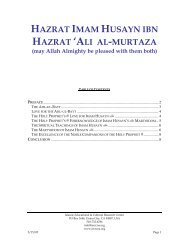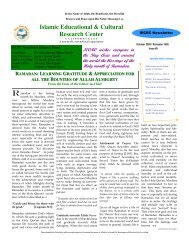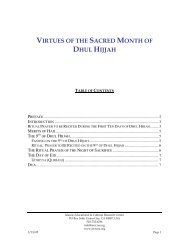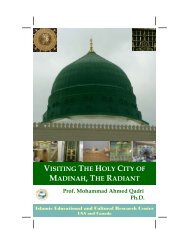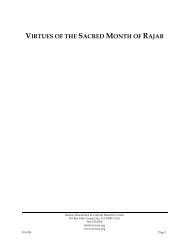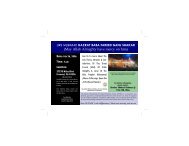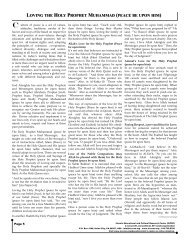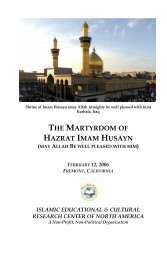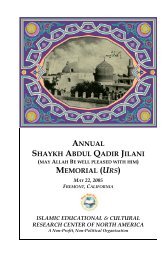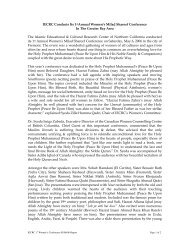Khwaja Ghareeb Nawaz rahmatullah alayh - IECRC
Khwaja Ghareeb Nawaz rahmatullah alayh - IECRC
Khwaja Ghareeb Nawaz rahmatullah alayh - IECRC
You also want an ePaper? Increase the reach of your titles
YUMPU automatically turns print PDFs into web optimized ePapers that Google loves.
was mainly sung, sometimes by a soloist, sometimes by a chorus, including<br />
instrumental elements of varying importance. The concert took place under the<br />
direction of a Shaykh. The solo singing was provided by a cantor. The faithful<br />
listened to the music seated, in a state of inner contemplation, and allowed<br />
themselves to be gradually overcome by trance. Return to calm and normality<br />
was likewise brought about by the sound of music suitable for that purpose.<br />
(Nayyar)<br />
Islamic Literature on Music<br />
Imam Malik prohibited songs and Imam Shafi’i said that Samaa is reprehensible<br />
(makruh). May Allah be pleased with both the great scholars of Islamic Jurisprudence<br />
(Fiqh). The question that arises though is that did they mean that all<br />
songs and all gatherings of Samaa are blameworthy?<br />
God Almighty says: “The worst of sounds is surely the sound of (the) donkey.”<br />
This verse also praises sweet sounds. Imam Al-Ghazzali presents some<br />
Hadeeth literature which allows for the hearing of sweet sounds. The Holy<br />
Prophet (Peace Be Upon Him, His Noble Family and Companions) said:<br />
“Adorn the recitation of the Quran with your sweet voice.” He (Peace Be<br />
Upon Him) once praised Abu Musa Ash'ari: “You have been given an instrument<br />
out of those of the family of David.” The Holy Prophet (Peace Be Upon<br />
Him) also said: “God did not send any Prophet without a sweet sound.” He<br />
(Peace Be Upon Him) also said: “If a man recites the Quran with a sweet<br />
sound, God hears his recitation more than one hears the songs of his female<br />
singer.” One Hadeeth praised the Prophet David (peace be upon him) by saying:<br />
“David used to sing with so melodious a sound that men, jinn, beasts<br />
and birds gathered together spell bound to hear it. Nearly four hundred persons<br />
expired thus by hearing his songs.” If Samaa is held unlawful, then to<br />
hear the sound of nightingale is also unlawful. If to hear the sound of nightingale<br />
is lawful then will it not be lawful to hear sweet and melodious sounds<br />
which have got wisdom and good meanings? (Al-Ghazzali)<br />
Hazrat Mumshad Ali of Baghdad (may Allah be well pleased with him), at<br />
whose command the Chishti Spiritual Order was established, said: “I asked the<br />
Holy Prophet (Peace Be Upon Him) in a dream: ‘O Messenger of God, do you<br />
dislike anything of Samaa?’ He (Peace Be Upon Him) said: ‘I don't dislike it,<br />
but tell them that they should begin it with a verse of the Quran and finish it<br />
with its verse.’” Hazrat Junaid Baghdadi (may Allah have mercy on him) said:<br />
“In three places, mercy is bestowed on people: at the time of meal as they do<br />
not eat unless hungry, at the time of Zikr as they make Zikr staying upon the<br />
high rank of the Truthful and at the time of hearing Samaa, as they hear it being<br />
Page 13



